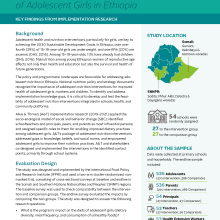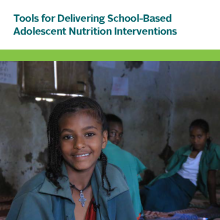Presentation
Apr 11 2023

Improving Adolescent Girls' Dietary Practices in Ethiopia: Results from Alive & Thrive's Implementation Research
This slidedeck was presented at Alive & Thrive's webinar, “Improving Adolescent Girls' Dietary Practices in Ethiopia: Results from Alive & Thrive's Implementation Research,” April 11, 2023.
Brief
Apr 06 2023

Improving Dietary Practices of Adolescent Girls in Ethiopia: Key findings from implementation research
From 2019 to 2021, Alive & Thrive supported the Government of Ethiopia to develop and implement an adolescent nutrition program to improve dietary practices among adolescent girls. This brief summarizes some of the notable highlights from the implementation research endline findings.
Toolkit
Apr 05 2023

Tools for Delivering School-Based Adolescent Nutrition Interventions
This catalogue presents school-based adolescent nutrition program leaders and implementers with a descriptive list of effective tools for delivering SBC-based adolescent nutrition interventions at scale.
Journal article
Mar 17 2023

Integrating nutrition and mental health screening, risk identification and management in prenatal health programs in India (Choedon T, Sethi V, et al. Gynecology & Obstetrics. 2023.)
In this paper, researchers present opportunities and challenges for integration of maternal nutrition and mental health screening and a management protocol at routine prenatal care in India, discuss evidence-based interventions in other low- and middle-income countries including India, and make r
Mar 13 2023

'First do no harm' overlooked: Video summary
Journal article
Mar 08 2023

The Impact of Vietnam’s 2013 Extension of Paid Maternity Leave on Women’s Labour Force Participation (Joyce CM, Nguyen TT, Pham TN, Mathisen R, et al, Journal of Asian Public Policy. 2023)
In 2013, Vietnam expanded its paid maternity leave from four to six months. This study evaluated whether the expansion of Vietnam’s paid maternity leave policy was associated with improved long-term labour market outcomes for Vietnamese women.

